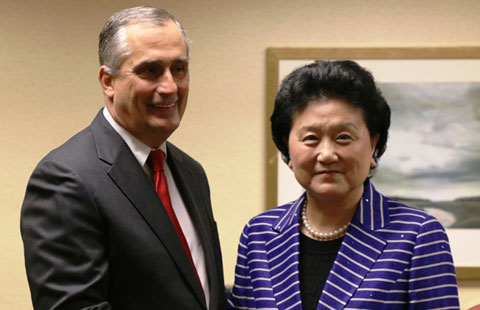Students urged to integrate
Updated: 2015-06-19 22:22
By Li Jing(China Daily USA)
|
||||||||
Those studying overseas need to busy themselves with more than just textbooks, experts say
For Chinese students studying abroad, competence in intercultural communication is as important as their academic success, according to experts.
At the recent 2015 Sino-US Education and Career Forum in Beijing, a session on the lives of Chinese students overseas drew a crowd of Chinese parents and students, as attendees discussed the difficulties Chinese students have encountered during and after studying abroad. Wang Lihong, who has had a career in US education for more than a decade, organizes the non-profit forum.
As Chinese enterprises are encouraged to “go out” and expand their investments overseas, Chinese investors are in great need of talent with both Chinese and foreign backgrounds.
“Go out” is a policy initiated in 1999 to encourage China’s enterprises to invest overseas.
Liang Tiehang, vice-president of TCL Multimedia, said they have a great shortage of talent.
“Rather than hire a foreigner, Chinese enterprises prefer a Chinese staff member to helm its overseas section, because it would be more efficient in communication with head offices in China and also in applications of global strategies,” Liang said.
But he said it’s difficult to find the right people. The major problem is with people who have received both a Chinese and foreign education have failed to obtain the skills necessary to communicate with foreigners.
“We found that even though they have received an education in the US, many have no close American friends and have language barriers in negotiations with local clients. The US is still a strange land for them,” Liang said. “They lack the capability of independent thinking. When they encounter problems abroad, they don’t know how to deal with them on their own.”
The phenomenon results from the fact that Chinese students studying abroad barely integrate into the local community, experts said.
“A fair number of students from China — a rapidly growing numbers and by far the biggest group of international undergraduates on US campuses — seem to be more interested in interacting with one another than with their American classmates,” said Que Dengfeng, the founder and CEO of Juesheng, a website promoting study opportunities in the US to the Chinese market. “As more Chinese are flocking to the US, I have seen that Chinese students tend to gather with people from their hometown, and speak their local dialects on the US campuses.”
According to the 2014 Open Doors Report on International Educational Exchange, the number of students from the Chinese mainland reached nearly 280,000, up 13 percent rise of 2013 and a fivefold on since 2000 — driven by a big increase in the number of Chinese students going overseas for their undergraduate degrees.
“Many of the students cited internal factors such as limited language proficiency or shyness, but they also described a perceived lack of interest on the part of American students in other cultures,” Que said.
Zhao Xue, who graduated from the University of Southern California Gould School of Law, said the enormous pressures on Chinese students in the US, both academically and socially, also have contributed to the disconnection.
“It’s very expensive to come to the US to pursue an undergraduate degree. There are often major expectations from family members and others. There’s a lot of pressure to succeed and do well,” she said. “And then there are the extra academic challenges inherent in pursuing a degree in a non-native language.”
Zhao said not every student would want to come out for mixers and “cultural coffee hours”.
“In addition, an academic success doesn’t promise any social success,” she said.
Sometimes, American classmates are indifferent to Chinese. She recalled an experience when she greeted an American classmate whom she had extensively talked with the night before. The classmate pretended not to know her.
She admitted she felt more pressure in social life than in intellectual studies when studying in the US.
“Instead of superficial contact with a lot of people, do more meaningful contact with a smaller number, and let them be your ambassadors to the larger student body,” she suggested.
lijing2009@chinadaily.com.cn
Most Viewed
Editor's Picks

|

|

|

|

|

|
Today's Top News
Obama suggests more gun control after shooting
Talks seen as prelude to visit by President Xi to US in September
The most costly cities for expats
House passes fast-track trade bill
Gunman kills nine people in South Carolina church shooting
US House moves to revive Obama's Pacific trade pact
Hong Kong lawmakers reject election reform proposal
Lies and false hopes entrap Xinjiangers
US Weekly

|

|














